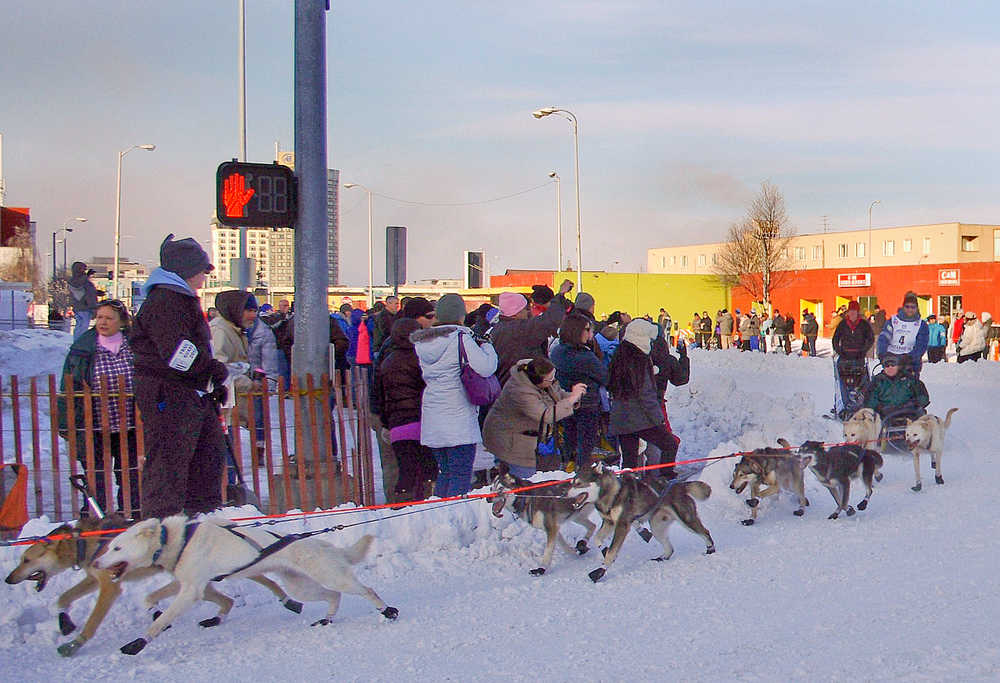ANCHORAGE, Alaska (AP) — Hordes of dogs, mushers and their eager fans mingled Saturday at the jovial celebratory kickoff of the Iditarod Trail Sled Dog Race in Anchorage.
Sixty-nine mushers and their teams of 16 dogs each inundated Alaska’s largest city for the annual ceremonial start of the race in a fan-friendly atmosphere. The real race starts Sunday, 50 miles north of Anchorage.
Early Saturday morning, musher trucks lined city streets, and fans like Nancy Alstrand of San Diego spent hours meandering from musher to musher, stopping to chat or pet dogs.
“Absolutely love the dogs,” Alstrand said shortly after taking a picture of one Husky with her iPad. “It infects you, their energy does, and it just makes you so happy.”
Her brother lives in Healy, Alaska, and they intend to make attending the Iditarod start an annual family reunion.
Later in the morning, mushers left the starting gate two minutes apart in the staggered launch to the race. Each carried an “Iditarider,” a person who won their seat on the sled in an auction.
The mushers take a leisurely 11-mile jaunt on urban trails within the city of Anchorage. Snow had to be trucked in to cover the streets of downtown Anchorage until mushers could get on the trail system.
A lack of snow and warm temperatures have been a headache for Iditarod officials this winter. In fact, temperatures in Anchorage were in the mid- to upper 40s in the days preceding the start.
Officials had considered moving the official starting point hundreds of miles north to Fairbanks, but said conditions had improved in the weeks ahead of the race to keep it in Willow, outside of Anchorage.
Concerns about the trail were in areas south of the Alaska Range and in the mountains themselves, race marshal Mark Nordman said. But snow and especially colder temperatures after a long January thaw have alleviated worries there and in areas such as the Yentna River.
“I think the thousand-mile wilderness trail is going to be a little bit of mystery no matter what, if it’s warm or if it’s cold, or it’s windy, or if it’s raining,” said musher Aliy Zirkle of Two Rivers. Zirkle has finished second each of the last two races.
“Every single year, I have to say, I go into it thinking, ‘What is it going to be like?’ And I don’t think this year is any different. I think it’s going to be hard, tough.”
Another fan favorite is veteran musher DeeDee Jonrowe, a breast cancer survivor whose signature piece of apparel is a hot pink parka.
“We’ve been out there a lot of years, I’ve seen them all,” she said of trail conditions. “I’m sure it’s not going to be anything I haven’t seen at some point of my career.”
There are six former champions in the field, including defending champion Mitch Seavey, also the 2004 winner.
“We’ve had really good training, real good conditioning,” Seavey told reporters. “We’ve been able to get all our training done, all our miles. I feel really ready, and real happy with my team.”
“I’d like it to be,” Zirkle said when asked if it was her year to win the Iditarod.
“The team is not a wild card; it’s the best team I’ve ever had,” Zirkle said. “But it comes down to what a musher’s prepared for, what their skills are, if they make the right decisions at the right time.”
After Sunday’s start in Willow, mushers will travel nearly a thousand miles, crossing two mountain ranges, the Yukon River and up the Bering Sea coast en route to the finish line on Front Street in Nome, on Alaska’s western coast.

